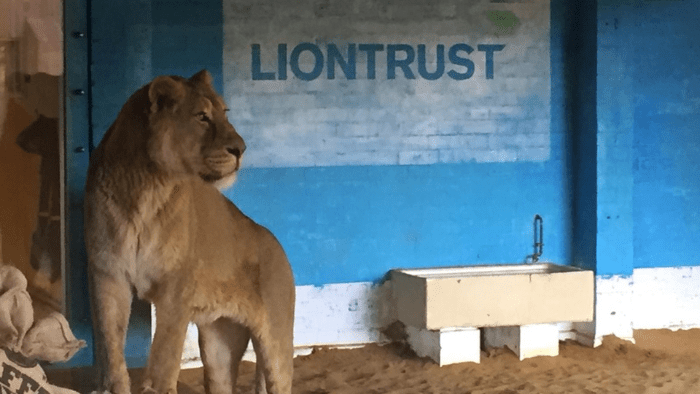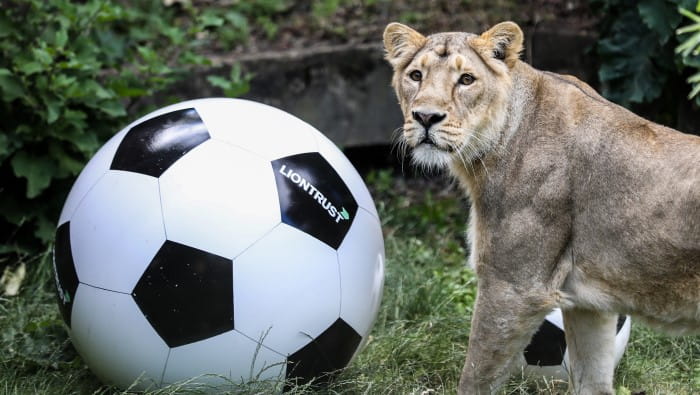Liontrust are proud sponsors of the global conservation charity ZSL and their efforts to protect the Asiatic lion from extinction, a partnership that stretches back nearly a decade.
London Zoo is home to a pride of Asiatic lions. An endangered species, there are fewer than 700 Asiatic lions remaining in the wild, and their dependency on one singular habitat in northwest India means the big cats are particularly vulnerable to natural disaster or a disease outbreak.
Liontrust 32% Growth for India's Asiatic Lions
Thanks to Gujarat State and ZSL’s efforts, supported by Liontrust since 2012, the Asiatic lion population has grown to 891. Explore the full story of this conservation success below.
Liontrust is celebrating the news that India’s wild Asiatic lion population has grown by 32% in the last five years, with the number of the iconic big cats now standing at 891. Thanks to the concerted effort and commitment of the Gujarat State, the Asiatic lion, once teetering on the brink of extinction, has made a remarkable comeback in its last remaining habitat.
Wildlife conservation is one of the three objectives of the Liontrust Community Engagement Programme, and we have supported global conservation charity ZSL’s efforts to protect the Asiatic lion from extinction since 2012.
This included ZSL signing a MOU with the Gujarat Forestry Department in 2015 for a project to support their extensive conservation efforts for Asiatic lions. Working with the Wildlife Institute of India for a number of years, a key contribution to the work was ZSL’s SMART conservation tool. ZSL’s SMART (Spatial Monitoring and Reporting Tool) approach is a combination of software, training materials and patrolling standards to help conservation managers monitor animals, identify threats such as poaching or disease and make patrols more effective. ZSL’s team also supported Sakkarbaug Zoo in Gujarat with veterinary and enrichment training for the Asiatic lions in their care, and their educational outreach programmes.
ZSL opened Land of the Lions at London Zoo in 2016 as a centre for its Asiatic lion conservation and education. Home to a pride of Asiatic lions, in the last year, London Zoo welcomed three cubs as part of the internationally co-ordinated conservation breeding programme for the species. The three cubs, two males and a female, ensure that an insurance population of Asiatic lions is kept safe and healthy in good zoos, should they ever be needed to repopulate the wild. As well as educating London Zoo’s millions of visitors on Asiatic lions’ wild range, their behaviour and vital role in an ecosystem, Land of the Lions spotlights the plight of the big cats and encourages global support for their conservation.

Male Bhanu and female Arya at London Zoo gave birth to three lion cubs in April 2024. These three cubs are not only a huge boost to the conservation breeding programme, which ensures a healthy population of lions are cared for in zoos to provide a vital safety net for the vulnerable wild population, but they will also inspire millions of people to care and take action for wildlife.

Liontrust and London Zoo asked primary school pupils from around the UK to nominate names for the three cubs. From the more than 650 names nominated by pupils, Liontrust and the lion keepers chose a shortlist of three names for each cub. Listeners to Times Radio and readers of The Times then voted on their favourite three names – Syanii, Mali and Shanti.
The iconic big cats which once roamed across Asia – from Turkey to Eastern India – are now found only in the Gir Forest in Gujarat, India. Thanks to conservation efforts, Asiatic lions were bought back from the brink of extinction and their numbers have risen slightly in the last decade, but their future is still precarious. Due to their limited range and reliance on a single habitat, Asiatic lions are particularly susceptible to disease outbreak or natural disaster.
ZSL, through its science and conservation efforts in the field and at ZSL London Zoo, is working to ensure a future for Asiatic lions. Liontrust’s partnership with London Zoo – run by ZSL – supports its mission to educate millions of people about wildlife and inspire them to act.

Five protected areas currently exist to protect the Asiatic lion in India: the Gir Sanctuary, Gir National Park and Pania Sanctuary form the Gir Conservation Area (GCA) covering an area of 20,000 km2 of forest representing the core habitat for the Asiatic lion. The other two wildlife sanctuaries, Mitiyala and Girnar, protect satellite areas within a lion’s range distance of the Gir Conservation Area.
ZSL London Zoo’s flagship exhibit Land of the Lions is an immersive and engaging hub for ZSL’s Asiatic lion conservation and education efforts, and an area sponsored by Liontrust. Transporting visitors from the heart of London to India’s vibrant Sasan Gir, people can get closer than ever before to the lions, while embarking on an adventure through the Indian-inspired experience. From exploring an Indian barber shop in the replica Sasan Gir high-street to a train-station, the exhibit truly gives visitors a sense of just how close lions and people live in India.
To find out more about the Land of the Lions, please click here.



